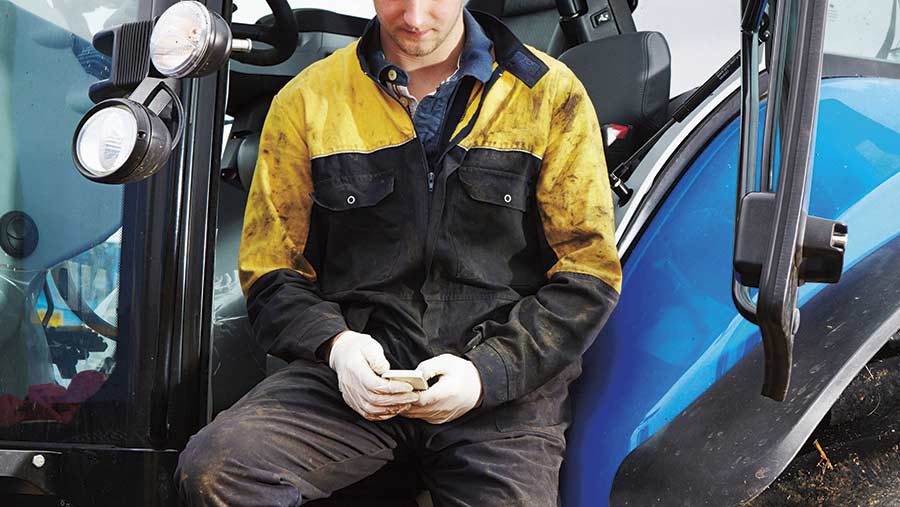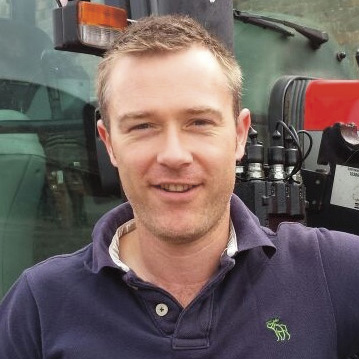Opinion: We farmers just bottle up our worries
 © Cultura/REX/Shutterstock
© Cultura/REX/Shutterstock Depression can be felt particularly acutely by many in the early new year, but it can be a taboo subject in farming communities.
It is a widespread problem, with many having experienced it – or known people who have.
But there is still a stigma attached to it and it can be a hard topic to talk about, especially in rural areas. However, help is at hand.
Wrexham farmer Will Evans shares his perspective on the topic.
This is a difficult one for me as I’m going to write about something that I’m not really sure I’m qualified for – and I desperately want to do it justice.
I’ve always lived in the farming community, but I’ve never been affected by mental health issues.
Down, stressed, worried, anxious, and occasionally overwhelmed, yes. But depressed, no. But it’s a very real issue affecting many of us in agriculture, and I’ve seen it in family members, friends and neighbours.
Clearly, it’s a case of “there but for the grace of God go I”.
 Will Evans, Wrexham farmer
Will Evans, Wrexham farmerIn the UK, a farmer commits suicide every week.
What’s making people so desperate that they’re taking their own lives?
Farming can be tough. Terribly so at times. We work extremely long hours, often in isolation. If it wasn’t for my family, I could easily go for days without seeing another human.
Livestock need feeding every single day of the year. If you’re ill? Tough, they still need feeding.
Got a bad back/knees/hips? Tough, it still needs doing. These things can drag you down. Nothing does like chronic physical pain.
Or perhaps it’s financial pressures. An overdraft stretched to breaking point will give you sleepless nights, further contributing to physical exhaustion.
Prices are low in agriculture, and many of my neighbours are struggling, or have left the industry in the past few years. They’re simply unable to put themselves, or their families through it anymore.
There’s the constant media criticism of our practices, and us as a community. There are newspaper columnists and “environmentalists” who make a good living out of it and, unfortunately, they have a large audience.
Farming charities
- The Farming Community Network www.fcn.org.uk, 03000 111 999
- Papyrus (working to prevent young suicide) www.papyrus-uk.org, 0800 068 41 41
- Young Minds (young people’s mental health and wellbeing), www.youngminds.org.uk, parents’ helpline 0808 802 5544
- The Royal Agricultural Benevolent Instutution www.rabi.org.uk, 0808 281 9490
- Samaritans www.samaritans.org, helpline: 116 123
- The Royal Scottish Agricultural Benevolent Institution www.rsabi.org.uk, 0300 111 4166
- The Addington Fund www.addingtonfund.org.uk, 01926 620 135
There’s the burden of overzealous officialdom and red tape.
Many older farmers can find this overwhelming. Think about how much the world’s changed in just the past five or six years.
Everything’s online. If you don’t have a younger family member or friend available to help you, that must be terrifying.
Then there’s the stigma and associated stereotypes of depression.
Farming is a small community where everyone knows each other. No one wants a neighbour saying: “Did you hear about so-and-so? Lost his/her marbles.”
The embarrassment at the perceived “weakness” is enough to stop many from reaching out and asking for help.
Many just put their heads down and work longer hours to try to get through it, and avoid dealing with people.
But even if none of these things apply, perhaps you just simply have no one else to talk to. Or maybe you do, but you find that no matter how hard you try, you just can’t.
It’s a British thing, isn’t it? Stiff upper lip and all that. Grin and bear it. Put on a brave face. B******s to that.
For years, until I met my wife, I fell into this category. Try as I might, I couldn’t find the words to express how I was feeling.
It became a real issue for me. We don’t in my Celtic family you see? We just bottle up all our worries and every day concerns for months until we explode.
But my wife, as anyone who’s met her will testify, is a talker. She communicates. It’s her thing. Being silent in her presence frankly just isn’t an option.
And God bless her for it, because being able to talk with her about my everyday stresses and concerns has helped me better find perspective, and to become a better man for it.
But not everyone’s as lucky as I am. There’s a side of farming that people really don’t see, where men, women and families are struggling on a daily basis, and are falling through the cracks and need help.
And it’s up to us all to look out for the signs of this in our neighbours, friends and family members, because no one’s immune to this illness.
The first step is to simply listen to a person’s problems. Talking nearly always helps. There are practical things you can do such as making sure the person is eating well and not drinking too much alcohol.
And if these simple things don’t work, try to get them to seek help through their doctor. There are some wonderful organisations out there (see “Farming charities”).
Social media can also help and there was a recent campaign on Twitter using the hashtag #FarmerMentalHealth. It’s an easy way to connect with like-minded people, without having to physically leave the farm.
Sometimes talking to a friend, or even a stranger, on one of the various networks or platforms, rather than to one who knows you and your family in the “real world”, can be easier.
Nobody looks after their own like the agricultural community. In times of trouble, we circle the wagons and help each other. Always have, and always will. And these are certainly troubled times that we’re living in.
So let’s do that. Let’s look out for the signs and help each other, because none of us really knows the burdens that our fellow farmers are bearing behind closed doors.
